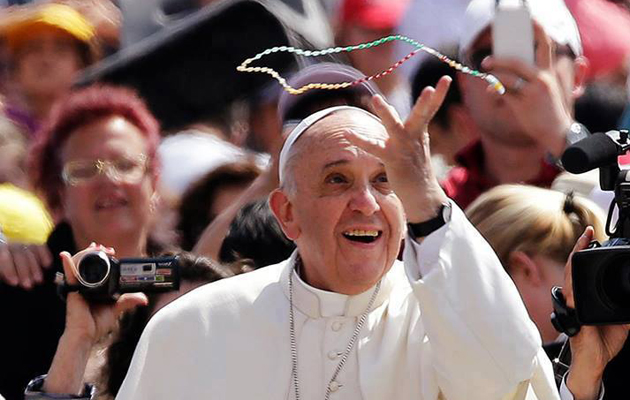Some of the language of the Pope seems to resemble Gospel emphases, yet the substance of it is still heavily sacramental and hierarchical.
 Pope Francis with Rosary beads.
Pope Francis with Rosary beads.
Two years ago Cardinal Bergoglio was elected as Pope Francis. With the precision of German technology, Cardinal Walter Kasper published the book Pope Francis’ Revolution of Tenderness and Love (Mahwah, NJ: Paulist Press, 2015) right in time to celebrate the second anniversary of his reign. In this volume, which has been produced in several languages, Kasper has collected some lectures on the Pope that he has given around the world in the past two years. Though each chapter stands on its own, Kasper sketches a coherent theological and pastoral portrait of Pope Francis, highlighting “tenderness” and “love” as two defining marks of the pontificate. Many of his evaluations of the Pope are shared by a large sector of progressive public opinion, both inside and outside of the Roman Catholic Church. What is really interesting is the way in which Kasper tackles one of the charges that often creeps in when commenting on the present Pope: is he liberal?
Radical?
Kasper summarizes the directions of Francis’s pontificate using some evocative words: surprise, mercy, renewal, ecumenism, dialogue, the poor. Each word describes a segment; taken together they form the axes of Francis’ worldview and action. The German Cardinal is aware that the Pope is often perceived as being attuned to the “liberal” spirit of the age: strong on social issues, relaxed in doctrine, wishing to include anyone at all cost.
Kasper disagrees with this assessment and suggests that Francis is not a liberal but a radical. Radical in the etymological sense of the Latin word “radix”: root or originating principle. According to Kasper the Pope is challenging the Church to be radical in the sense of re-discovering the roots of the Gospel which are joy, mission, frugality, solidarity with the poor, freedom from legalism, and collegiality. Kasper argues that the Pope’s tendency is not to run after the political correctness of Western liberalism, but to call all Christians to recover the living source of their faith, i.e. the roots of the Christian life. Francis is a radical Pope who has impressed a different style, language, and emphases to the Papacy out of his desire to embrace and to live out the fundamental principle of the Gospel.
A Selected Radicalism
Kasper’s reading of Francis is clever and insightful. It encourages us to move beyond the usual polarizations between “liberals” and “conservatives” within the Church by introducing a third category, that of “radicals”. Two brief comments can be suggested. First, Francis appears to be radical on certain issues and much less so on others. He is radical on poverty, but is silent on the massive financial power of his Church. He seems to be radical on mercy, but never mentions original sin and divine judgment over all sinners outside of Christ. He is radical in advocating for simplicity, but keeps the expansive apparatus of an empire like the very system of which he is the head. He is radical in denouncing the tragedies of unethical capitalism, but seems to be much less outspoken towards the immoral deviations of personal sexual life. In other words, his radicalism is somewhat selective. Radical here, much less so there. In a certain sense, “liberals” are radical on social issues, while “conservatives” are radical on doctrinal issues. Everyone is radical in some sense. There are different shades of radicalism. Francis’ radicalism is much closer to the liberal version than the conservative one. Therefore, playing a bit with words, the question is whether or not his radicalism is radically different from a more liberal tendency. Historically speaking, the root of theological liberalism lies in the preference given to religious feelings over doctrinal expressions. And this is exactly what the Pope seems also fond of doing. If mercy and tenderness describe the overall message of Francis, they sound more like liberal catchwords than traditional ones.
In a certain sense, the Protestant Reformation was a radical movement motivated by an aspiration to go ad fontes (back to the Bible), back to the Word of God, and aimed at recovering the radical Gospel of solus Christus (Christ alone) and sola gratia (grace alone). There is very little of this form of Christian radicalism in Francis’ pontificate. Some accents seem to point to the need of being exposed to the written Word of God and yet many more are still placed on practices and traditions which can hardly be found in Scripture. Some of the language of the Pope seems to resemble Gospel emphases, yet the substance of it is still heavily sacramental and hierarchical. Borrowing the title of Kasper’s book, Francis’ insistence on mercy and tenderness lies within the context of a less institutional, but still unreformed, traditional Roman Catholicism.

Las opiniones vertidas por nuestros colaboradores se realizan a nivel personal, pudiendo coincidir o no con la postura de la dirección de Protestante Digital.
Si quieres comentar o